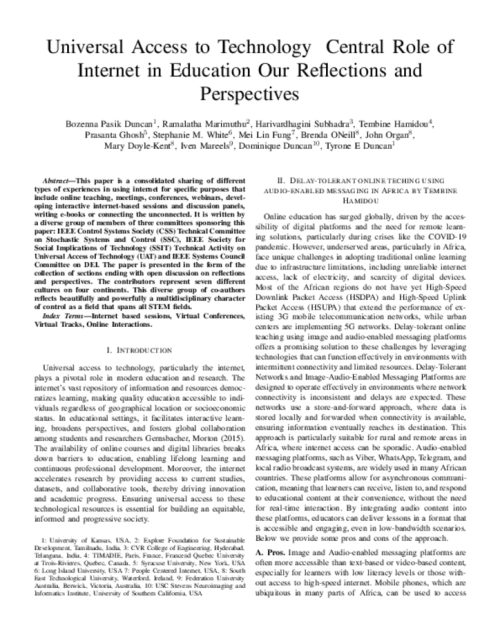2024 Systems Council DEI Committee News
The Systems Council, Control Systems Society, and Society on Social Implications of Technology DEI Committees have sponsored the paper titled "Universal Access to Technology Central Role of Internet in Education Our Reflections and Perspectives" by co-authors Bozenna Pasik Duncan, Ramalatha Marimuthu, Harivardhagini Subhadra, Tembine Hamidou, Prasanta Ghosh, Stephanie M. White, Mei Lin Fung, Brenda O Neill, John Organ, Mary Doyle-Kent, Iven Mareels, Dominique Duncan, Tyrone E Duncan. This paper has been accepted for presentation at the 4th IFAC Workshop on Internet-Based Control Education (IBCE24) to be held in Ghent Belgium.
Dates: 18-20 September 2024
Location: Ghent Belgium
Abstract: This paper is a consolidated sharing of different types of experiences in using internet for specific purposes that include online teaching, meetings, conferences, webinars, developing interactive internet-based sessions and discussion panels,writing e-books or connecting the unconnected. It is written by a diverse group of members of three committees sponsoring this paper: IEEE Control Systems Society (CSS) Technical Committee on Stochastic Systems and Control (SSC), IEEE Society for Social Implications of Technology (SSIT) Technical Activity on Universal Access of Technology (UAT) and IEEE Systems Council Committee on DEI. The paper is presented in the form of the collection of sections ending with open discussion on reflections and perspectives. The contributors represent seven different cultures on four continents. This diverse group of co-authors reflects beautifully and powerfully a multidisciplinary character of control as a field that spans all STEM fields. The Takeaways from the First Systems Council Online Undergraduate Students Conference are presented in the Section III.
Overall Perspectives: The authors, who have culturally and ethnically different backgrounds, have provided their experiences and insights in using the internet to enable the learning of students and professionals in different scenarios. Teaching through audio enabled messaging platforms for a class of students in underserved areas of Africa seems to be a cost-effective solution while offline video education in the regional languages with online evaluation have proved to be effective in the rural areas of India. The learning level depends on connectivity, the motivation of the students and the effectiveness of the materials delivered. For teaching hands on lab courses, development of platforms such as ENOLL has become imperative so as to provide a structured, innovative, inclusive and effective approach. A combination of online and in person teaching seems to improve the turnout and the vibrancy of the class 100% and enhances collaboration among the students as shown in the University of Kansas. Virtual Conferences and virtual competitions such as SYSCON and YESIST12 have become successfully scalable to different continents since they provide an opportunity for students with innovative ideas to present their work without the hassle and expense of travel. We can conclude that technology and internet enhanced learning has proven to benefit the teachers, students and the organizations as a whole.
Acknowledgements: Bozenna Pasik-Duncan, as the Chair of the three IEEE committees sponsoring this paper on behalf of Ramalatha and Harivardhagini, coordinators of this joint project, would like to take the opportunity to thank all members of the committees and contributors to this paper for their leadership, unparalleled and most exciting and joyful collaboration in many different forms of education at multiple levels. This amazing collaboration, confidence, and friendship mean the world to me and make me and my students feel very proud. Big thanks go to the organizers of this terrific and important conference for their encouragement and warm invitation.


